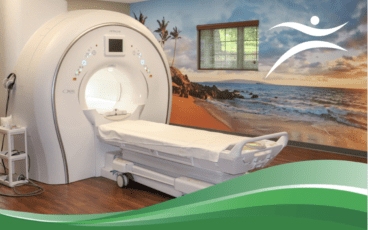An MRI (magnetic resonance imaging) is a medical scan similar to an x-ray or CT (computerized tomography) scan. However, unlike x-rays and CT scans, MRIs are done without any radiation. The two main kinds of MRIs are contrast and non-contrast.
You may be wondering, “What is an MRI with contrast?” This type of MRI differs from a regular MRI because it uses a contrast dye that’s injected into a patient before having the scan. If you need an MRI with contrast, here is why it is done and what to expect.
Uses and Advantages
Physicians order contrast MRIs for their patients because they do a better job of showing clear images for certain conditions. Sometimes a physician will recommend an MRI with contrast after a regular MRI has unsuccessfully rendered the quality of images needed. This type of MRI is often a good option for patients after they’ve undergone back surgery as the dye renders not only clearer, but sharper images.
What’s Involved in a Contrast Injection?
Gadolinium, which is a paramagnetic metal ion, is commonly used in contrast MRIs because of the way it travels within magnetic fields. In fact, it’s used in about 30 percent of MRI scans.
After placing a tourniquet around your hand or arm, your technician will use an IV or a small butterfly needle to inject the gadolinium or another type of contrast material. Roughly 10-20 milliliters of dye will be injected into your vein. The injection takes from 10-30 seconds.
Next, the radiologist removes the needle and places you into an MRI machine for your scan. The gadolinium contrast medium can also be administered by using an automated injector.
How to Prepare
Unless your doctor tells you otherwise, eat normally and keep taking your medications before your contrast MRI exam. Always consult with your physician before making any changes to diet or prescribed medication.
You’ll have to complete a screening form in which you will note any health conditions that could present a health risk or interfere with your exam. You’ll also be interviewed by a technician to make sure you understand all the questions on the screening form.
You can’t wear anything that’s metallic, so you’ll have to remove metal jewelry, watches, hairpins and other items. This even includes credit cards that have magnetic strips, belt buckles, shoes, pens, keys, coins, hearing aids and all electronic devices.
Most importantly, you should relax during your scan. Be sure to discuss any fears you may have, such as possible side effects, with your technician or physician. Don’t hesitate to call your orthopedic doctor if you have any questions about a contrast MRI.
IBJI offers appointments for same day or within 24 hours Monday through Friday, with many office throughout the Chicago area.
Simply call 855-IBJI-MRI (855-425-4674) or contact us online for a location near you.




